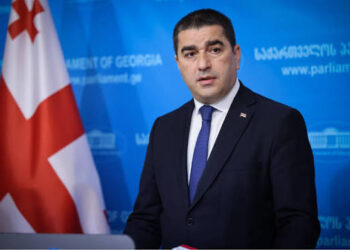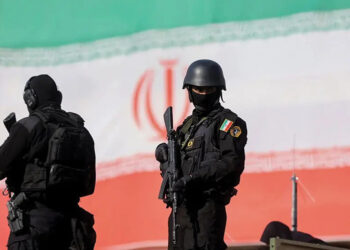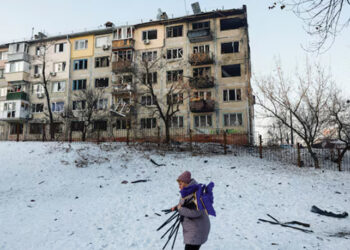We have to deal with this now. We can’t act as if it didn’t happen. There’s a full-fledged war happening on European territory. History has taught us that if a war starts in Europe, you never know how it will end. No-one knows what’s coming next. – Tiny Kox, President of the Parliamentary Assembly of the Council of Europe, tells RFE’s Georgian service in an exclusive interview. “Does Putin have a plan?” he asks. “[Russian] Parliament doesn’t know it plays a role in this – it acts as an applause machine for the president. They all just clap, and ask no questions. I think in every parliament, at least someone should ask the question: why are we doing this? The fact that we did not see that there demonstrates that the Russian parliament does not play a role in the government, and it’s clear that Putin is the one who decided to start this war. But he never showed anyone a plan.”
Should Russia’s expulsion from the CoE have happened sooner? Was it a mistake to welcome them back a few years ago?
They were for 26 years, a full-fledged member of the Council of Europe. This idea that they were “out” is not factual. They were never “out” of the Committee of Ministers. The only thing that happened is that the Russian parliamentarians were for a few years not represented there, a fact not so painful for the Russian parliament. The perception was that Russia was out, while the reality was that Mr. Lavrov and his country’s representatives were full-fledged members every day, all these years; there was not a moment that Russia was not involved in the decision making. And that is why I did my best to make it clear that we had to change that. And, in 2018, we changed the mechanism. I know that my friends in Ukraine were saying: “Oh, you’re bringing the Russians back!” But what I said was: “You are either in or you are out. The Council of Europe is not a cafeteria; you can’t decide whether you’re in or out. If you’re in, you’re in; if you’re out, you’re out – it’s what the statute says.” And that’s what we then agreed on: “Okay, from now, this will be the rule: If in the future we have, again, a blatant violation of the statute, then there will be a mechanism that gives, for the first time ever in 70 years, the assembly the right to trigger a procedure that could lead to the expulsion of a member state.”
Since we’ve had these new rules, after we saw this blatant violation by Russia of Ukraine, it took us just three days to suspend Russia, and three weeks to expel them.
Going back to 2008, is it safe to say that the Council of Europe back then should have done more, could have done more, and they turned a blind eye to it?
I think 2008 was a different situation. The difference was that, although it was clear, to me at least, that Russia was waiting for a chance to have the war in South Ossetia [ed. Tskhinvali], the report from my good colleague Heidi Tagliavini stated it was started by Georgia, by mistake, by too much bravado or whatever.
A country of three million citizens decided to attack a country of 145 million by mistake?
No, but you could perhaps say it was a preemptive strike from Saakashvili. The moment he started to shell Tskhinvali, the Russians brought their troops to the Roki Tunnel. They were waiting there. So you could say it was a bit different. The Russians then at least had an argument: “We have peacekeepers over there, they are now being shelled and we have to protect them.” The story was at least good enough. And it would have been good enough if they had stayed in South Ossetia. But of course, then the Russians said, “Oh, we can go to Tbilisi,” and the tanks started to head towards the Georgian capital and they started bombing the area and so on. And then the United States said, “No, sorry, that’s the red line, if you go further, we’ll have a casus belli.” And then the Russians stopped. They destroyed quite a lot of things. They took South Ossetia and named it an independent country and so on. But the story is a bit different. And I think that the government after Saakashvili decided that what “our good friend Misha” had done was perhaps not the wisest thing. He was here, saying that “I will never use violence to get South Ossetia back”. And he did start to use violence. And that gave the Russians an argument. Of course, it’s no excuse [for what the Russians did]. It was not that they had to call the troops from Moscow all the way to South Ossetia. They were waiting there, hoping that Saakashvili would make that mistake. So you cannot completely compare the reaction of the international community then and now. Then there was a negotiated settlement…
Which remains unfulfilled.
Sure, sure. But it was a war starting, a reaction and an overreaction. This assembly said, “Listen, the fact that you [Russia] went to South Ossetia was not a blatant violation of international law, because there were [Russian] peacekeepers, but when you started to destroy property and kill people in Georgia, that was a blatant violation of international law.” It was a very short but devastating war, but it did end with some kind of a solution. The solution never did function, but back then, the international community did not say as it is saying now, “Sorry, but Russia has to be excluded from everything.” I’m not so much a fan of saying “We should have done something else,” because we did what we did. 2014 could have been a moment to say “Sorry, but this is blatant violation.” This assembly said it, the Committee of Ministers said it as well. The problem was that the Committee of Ministers did not act.
You said that “we need this war to end, we need a ceasefire”. Whose is the first step to make?
It should be the Kremlin, because the authorities from the Russian Federation blatantly violated international law. So they should step back.
Do you see them stepping back?
I don’t know. We have a problem that in such a big country, we have such small circles of interest. I’m not a believer of the idea that there is only one man who decides everything in Russia. It’s clear that the president decides a lot and people are very much afraid of him. But there are more people with interests in Russia, and Russia is not a democracy, not a rule of law country: it’s a country where the rule of power is very important [and] the rule of money. So, there are many people who are involved in this decision. I saw some figures showing what oligarchs have lost [due to the sanctions] – they have lost fortunes. The good news for them is that they have more money than you and I together. But the bad news is that they lost sometimes half of their fortune and that must be a pain for people who are more interested in money than they are human rights. I don’t know what the effect will be. But there must be some growing doubts in those who see their assets, their capital, their fortunes, in danger. We know some of them. We have seen some, like Mr. Tinkoff, who says, “This is wrong.” I hope that he says that because he has been enlightened, but [we know] he’s also thinking about his money. We know the oligarchs are powerful in Russia and we know that the President has taken a lot of power from them. He has told them in the past: “Steal whatever you want, but don’t interfere with my business, because otherwise you will go to prison.” But being realistic, I think there have to be effects, the problem is we cannot see them, so we cannot rely on them. But it would also be stupid to believe that as long as this one man makes the decisions, nothing is going to change.
What is it that might make Putin step back?
Powerful people saying, “You are the president of the Russian Federation, but from now on, we decide.” As happened with Mr. Khrushchev- he wasn’t expecting people to show up at his holiday home and say, “Nikita, it’s over now.”
The Politburo back then was quite a different structure. Could you give me one name out of 145 million people that you’d stake your money on to change something in Russia?
No, no, that would be very arrogant. Because, if we could do that, then we’d all have failed, because we should have had negotiations with that man or woman. But I know that if powerful people are under pressure, then they act. Until now, it seems that they have been acting together with the President.
The very president who allowed them to get rich, so they owe him.
Yes. They are committed to each other. We have to understand that there could be a moment that changes things, but we can’t say when it will happen. They could stay committed to each other for months or years. You never know. So, more important is at this stage is that Russia loses its friends. If Venezuela, Nicaragua, Eritrea, and the great man in North Korea are the company you keep, and the other big powers abstain from voting, but do not say “we support the Russian President,” that must be disappointing for him. International order and international law is not something for softies. It is a basis from which to prevent things from happening, from getting out of hand, especially in the case of powerful countries. They don’t like to be surprised. So I think international pressure is very important. I think, for the first time ever, we are talking about sanctions that really do hurt. We’ve had sanctions in place for years, yet I didn’t see many oligarchs or Russia falling to poverty. We kept buying Russian gas and they kept getting our euros. They weren’t asking for rubles, but they got our euros and they built that filthy rich kingdom with them. So the sanctions, they are far more powerful now, but we could do far more still.
It is a dangerous and reactionary idea that “Russians are Russians, so they will never develop as other countries and people can develop. It’s wrong. But if it’s true, we really are in deep shit, because that means that the biggest country on Earth can never develop
Many Western countries rely on Russian oil and gas, and it’s a problem to decide whether to keep that gas supply open and stop Russia getting our euros, or to cut it off and freeze this winter. The answer is that sometimes you should freeze. Just compare that suffering with the suffering of the Ukrainian people now. We all have to pay something, we cannot liberate and protect Ukraine for free- we have to commit ourselves. And we’re sending humanitarian aid, which is right. Weapons are to be discussed. But if the Ukrainian government asks for arms, governments are entitled to deliver because that is not a violation of the UN Charter – it’s a matter of self-defense.
There’s no way out for Putin, because he has burnt so many bridges already. But this also makes him very dangerous
During the Covid crisis, so many governments showed that you can take enormous measures. In the Netherlands, we closed down half of our industry, with a guarantee to the companies that the money they lost would be compensated and the staff would get their salaries. Such a gesture was unthinkable before Covid. But we did it, and if you can do it during a pandemic, you can also do it now when we are talking about a third world war that is even worse than Covid.
“There will be a moment when Russia comes back to the European community,” you said. In what circumstances do you see Russia welcomed back to the CoE / PACE?
Let’s take at small look into history. There is never a country that is isolated forever. There will be a moment. But it’s not like you can say, “Let’s wait a year or two.” I know a lot is broken now. And to manage that will take years and years and years before the international community starts to regain a bit of trust in whatever Russian government comes next. That will take a lot of time and a lot of effort. But there being trust in a government led by the current president? I don’t see it. I don’t see that because he has burnt so many bridges already. For him, there’s no way out, but that also makes him very dangerous. There’s no way out for Russia, even if Russia withdraws from Ukraine, if it is capable of doing so. We have seen that when Russia enters, it doesn’t leave. Georgia is a prime example. But even if they pull out, then there is still this breach of credibility. And I really believe that only when Russia is able to start, I will not say democracy, but of rule of law, as the basis of society, can you have a real discussion.
In Russia, there is no democracy, there is no history of it, but I do not believe that Russians are not capable of developing themselves. If you go to the Tretyakov Gallery in Moscow, and you see all these beautiful paintings, you will see our civilization in Russia as well. And if there is civilization, there’s also a possibility to develop. And so, it is a dangerous and reactionary idea that “Russians are Russians, so they will never ever develop as other countries and people can develop.” That is the wrong idea, I think, because if it’s true, we really are in deep shit, because that means that the biggest country on Earth can never develop.
Interview by Vazha Tavberidze














